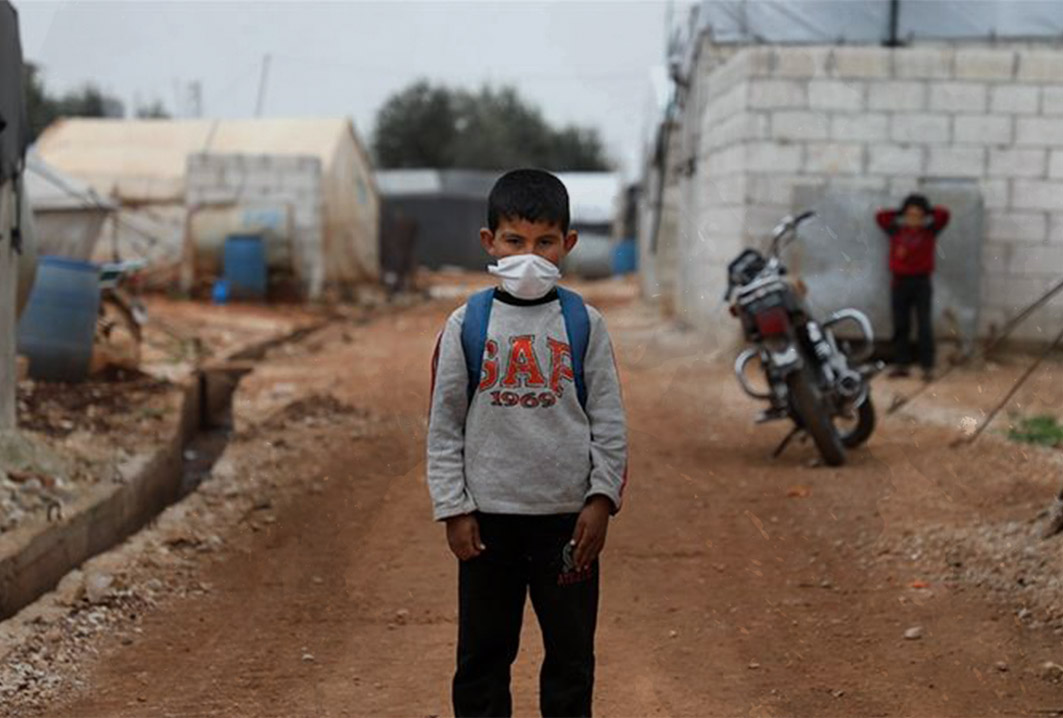14 June 2020
The Northwest of Syria remained isolated from the spread of the Coronavirus until June 9th, 2020, when four people were recorded as having contracted the virus, including doctors. This constitutes a real horror among the residents of the northwest, which includes approximately 4 million people in a narrow land area, half of whom live in camps and random gatherings on the border with Turkey. In this area, the population density per square kilometer reaches between 60 to 70 thousand people, and each tent generally contains between 6 to 12 people.
The first infection case was recorded for a medical staff member who was working in the Bab Al-Hawa Hospital near the Syrian-Turkish border on 7 July 2020, and then two other cases were announced among those who had been in contact with the first person, which caused confusion and fear among the working medical staff and residents due to the weak infrastructure in the medical sector in general, and the equipment to deal with the emerging virus in particular. There are only 3 ready quarantine centers, and currently 15 centers are being prepared, according to the Health Directorate in Idlib. In addition, there is poor infrastructure, overpopulation, and extreme poverty. All of these factors make it almost impossible to limit the spread of the virus through preventive measures.
Abu Muhammad, a displaced person from Khan Shikhoun who lives in the Al-Karama camps near Qah, says:
“My daughter was mocked today in the examination room because she sneezed inside the hall; the girls started to intimidate her and tell her that you have Corona. The teacher asked my daughter to isolate herself from the family and gave her some awareness instructions to prevent the virus. We are 8 people in one tent and we have a small space in front of it, which we have not been able to expand since we lived in it from the beginning of 2013. How can my daughter isolate herself and how will she implement preventive measures? The water we get for 20 minutes early in the morning is only enough to fill two barrels and not enough for washing, cleaning and bath, especially in the summer if we want to wash. We are unable to purchase sterilizers, antiseptics, and soaps. I work all day with a wage of 5,000 Syrian pounds and barely enough for food. People are in desperate need. Corona came to us after we escaped the bombing, we did not fear the bombing, but now we fear death from starvation in displacement, and now we also fear death due to the Corona. Take us back to our towns and there so that if we die, we will die on our land and home”.
Mrs. Najah, who has been living with her five children in an Atma camp for internally displaced people in northwestern Syria for 6 years, also points to her fears and grave concern that she lives with her relatives and neighbors within the displacement camp after receiving news of the registration of several cases of Coronavirus in the hospital near their camp, and she says:
“I feel a great fear and terror for my family, and I am trying to prevent my children from going out and mixing, but I cannot control them because of the extreme heat and darkness of the tent, the space for a large family in difficult living conditions that we have been living in for a while, the rate of aid decreases for basic materials that were available to some extent and we do not know the reason for losing a large part of it, as well as how we can protect ourselves and our children from this contagious epidemic – is it sufficient to distribute brochures and methods of virus protection only? Today, we are in dire need of detergents, antiseptics and preventive materials. How can I feed and protect my children with the absence of my husband, who moved to Turkey some time ago to try to work and provide us with some needs? Today everything is missing and the prices are very expensive with the collapse of the Syrian pound, and my situation today is similar to hundreds of displaced families in the camps and the region whose population is mostly women, children and people with special needs of the elderly and war wounded. Coronavirus spreads.
The Syrian Civic Platform realizes the danger of the spread of the virus in northwestern Syria and raises the alarm for what might cause the elimination of hundreds of thousands of people in light of the presence of factors that do not promote adherence to precautionary measures, as well as the worn out medical sector due to war and targeting. The Syrian Civic Platform calls on the international community to act effectively to confront a possible spread of the virus in the region in the following ways:
- To push for a political solution requires that the displaced be returned to their areas within international protection with guarantees that protect their lives.
- Facilitate the movement of medical and preventive aid through the border crossings, freely grant special permits to humanitarian organizations, and move and provide assistance.
- Allocate urgent aid for early detection devices for Coronavirus infection and provide preventative materials.
- Providing medical centers for persons with Coronavirus with supervision by a competent staff in dealing with the infected women and men.
- Supporting humanitarian organizations and increasing the amount of medical and preventive assistance to hospitals and health clinics.
- Work to immediately reduce congestion in displacement camps by expanding the camps or establishing new ones.
- Providing detergents and preventative materials with adequate water and an increase in the number of public toilets in camps and informal settlements.
- Provide adequate support at all levels and good monitoring of the camps under international supervision and with local assistance.

